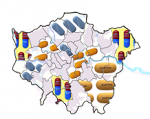London: cases of bad patient care from new guidelines
24 June 2011. Related: News.
 The changes to ARV prescribing in London were first reported in detail by i-Base here in April.
The changes to ARV prescribing in London were first reported in detail by i-Base here in April.
We are now hearing from people where the new guidelines are not being followed. This includes cases of people having medications switched without a discussion with their doctor (first realising this at the pharmacy), being misinformed about the reason for a switch, and being told to switch rather than this being an option.
This is not helped by the poor availability of information from the London Specialised Commissioning Group. It is not acceptable that the group have not published the evidence base for these changes, even though the changes themselves have been evidence-based.
There has also been confusion about individual clinic targets that may be driving doctors to switch patients inappropriately. There is even less information available about this. Given the SCG is driven by the goal of achieving and maintaining equality of access to care across London, the group need to hear when this is not occuring.
Currently, most information has been provided by community organistations.
The process for providing HIV treatment in London has been highly protective of patient care. The outcome is not the cheapest possible treatment. It is about not choosing more expensive drugs unless similarly effective options cannot be used for clinical reasons.
If the guidelines are not being followed it is important that the Commissioning Group is made aware of this. The changes in London are being audited for safety outcomes on a three-monthly basis but individual examples of inappropriate care also need to be reported in real time.
The UK-Community Advisory Board is collecting cases at this link:
http://www.ukcab.net/forum/index.php?topic=1240
This is an open access page but also has contact details if you would prefer to contact someone privately and in confidence.
Summary of London guidelines
1) To use NNRTI-based treatment in first-line therapy when clinically appropriate and PI-based treatment when not.
2) For nucleosides, to use Kivexa (abacavir/3TC) in preferenece to Truvada (tenofovir/FTC) in first line therapy when this is clinical appropriate. The definition of clinically appropriate includes:
- viral load below 100,000 copies/mL,
- not having a high Framingham risk for cardiovascular disease, and
- testing negative to HLA-B*5701 (to reduce the risk of a hypersensitivity reaction).
3) In second-line therapy to use atazanavir boosted by ritonavir with two NRTIs as preferred-PI choice. Alternative PIs can be used when this is not appropriate.
3) Talking to people on PI-based combinations that do not include atazanavir about the clinical benefits from switching to this PI. Switching is recommended where there are clinical benefits from the switch with a target of only 10% of people needed to switch to reach budget savings.
4) The highest cost drugs, developed primarily for people with drug resistance, can still be used when this is clinically appropriate. The guidelines are least clear on this, with no specific reference to etravirine or maraviroc. When these drugs are clinically required they will still be used and available.
5) All the drugs previously prescribed can still be prescribed.
It should be noted that these ‘guidelines’ only exist as a summary PDF slide set on the London Specialised Commissioning website.
A very basic leaflet for patients is also available without reference to specific drugs.
The evidence base for the changes and supportive documentation on the implications for individual clinics in terms of prescription targets has still to be published.
